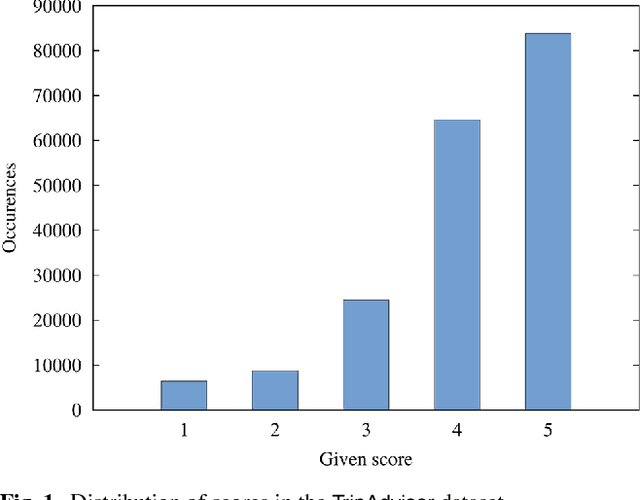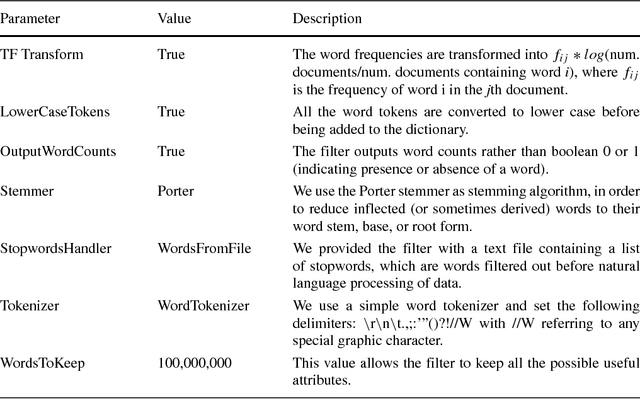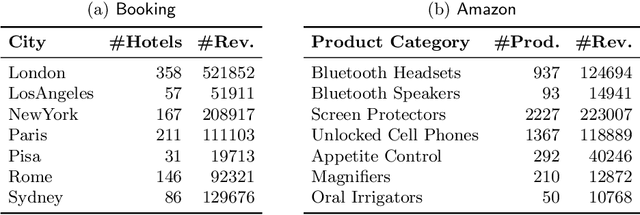Michela Fazzolari
Improving Opinion Spam Detection by Cumulative Relative Frequency Distribution
Dec 27, 2020



Abstract:Over the last years, online reviews became very important since they can influence the purchase decision of consumers and the reputation of businesses, therefore, the practice of writing fake reviews can have severe consequences on customers and service providers. Various approaches have been proposed for detecting opinion spam in online reviews, especially based on supervised classifiers. In this contribution, we start from a set of effective features used for classifying opinion spam and we re-engineered them, by considering the Cumulative Relative Frequency Distribution of each feature. By an experimental evaluation carried out on real data from Yelp.com, we show that the use of the distributional features is able to improve the performances of classifiers.
A study on text-score disagreement in online reviews
Jul 21, 2017



Abstract:In this paper, we focus on online reviews and employ artificial intelligence tools, taken from the cognitive computing field, to help understanding the relationships between the textual part of the review and the assigned numerical score. We move from the intuitions that 1) a set of textual reviews expressing different sentiments may feature the same score (and vice-versa); and 2) detecting and analyzing the mismatches between the review content and the actual score may benefit both service providers and consumers, by highlighting specific factors of satisfaction (and dissatisfaction) in texts. To prove the intuitions, we adopt sentiment analysis techniques and we concentrate on hotel reviews, to find polarity mismatches therein. In particular, we first train a text classifier with a set of annotated hotel reviews, taken from the Booking website. Then, we analyze a large dataset, with around 160k hotel reviews collected from Tripadvisor, with the aim of detecting a polarity mismatch, indicating if the textual content of the review is in line, or not, with the associated score. Using well established artificial intelligence techniques and analyzing in depth the reviews featuring a mismatch between the text polarity and the score, we find that -on a scale of five stars- those reviews ranked with middle scores include a mixture of positive and negative aspects. The approach proposed here, beside acting as a polarity detector, provides an effective selection of reviews -on an initial very large dataset- that may allow both consumers and providers to focus directly on the review subset featuring a text/score disagreement, which conveniently convey to the user a summary of positive and negative features of the review target.
Mining Worse and Better Opinions. Unsupervised and Agnostic Aggregation of Online Reviews
Apr 18, 2017



Abstract:In this paper, we propose a novel approach for aggregating online reviews, according to the opinions they express. Our methodology is unsupervised - due to the fact that it does not rely on pre-labeled reviews - and it is agnostic - since it does not make any assumption about the domain or the language of the review content. We measure the adherence of a review content to the domain terminology extracted from a review set. First, we demonstrate the informativeness of the adherence metric with respect to the score associated with a review. Then, we exploit the metric values to group reviews, according to the opinions they express. Our experimental campaign has been carried out on two large datasets collected from Booking and Amazon, respectively.
 Add to Chrome
Add to Chrome Add to Firefox
Add to Firefox Add to Edge
Add to Edge